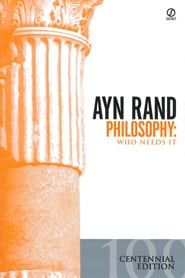

In Philosophy: Who Needs It, a collection of essays written by Rand in the years following Atlas Shrugged, she argues that philosophy is not a pastime for brooding teenagers or ivory tower intellectuals. It’s a subject that deals with some of the most important issues in human life. What kind of world do we live in? How do we separate knowledge from error? What is good and what is evil?
In Rand’s view, we cannot avoid having — and acting on — some answer to these questions.
“Your only choice is whether you define your philosophy by a conscious, rational, disciplined process of thought and scrupulously logical deliberation — or let your subconscious accumulate a junk heap of unwarranted conclusions, false generalizations, undefined contradictions, undigested slogans, unidentified wishes, doubts and fears, thrown together by chance, but integrated by your subconscious into a kind of mongrel philosophy and fused into a single, solid weight: self-doubt.”
— Ayn Rand, “Philosophy: Who Needs It,” Philosophy: Who Needs It
Philosophy: Who Needs It is the last work planned by Ayn Rand prior to her death in 1982. In these essays, Rand shows how abstract ideas have profound real-life consequences. She identifies connections between egalitarianism and inflation, collectivism and the regulation of pornography, alcoholism, and the problem of free will vs. determinism.
Contrary to the notion that philosophy is detached from the practical concerns of life, Rand sees philosophy’s influence everywhere, leading her to ask questions like: How can a person’s views about metaphysics impact his ambition and self-confidence? How has the notion of “duty” given morality a bad name? How did the belief that faith is superior to reason unleash the horrors of twentieth-century totalitarianism?
Philosophy: Who Needs It also includes Rand’s assessment of a number of prominent thinkers, including John Rawls, John Maynard Keynes, B. F. Skinner, and, above all, Immanuel Kant, whom Rand regards as her arch philosophical adversary.
In these eighteen essays, readers learn why Rand’s answer to the question of who needs philosophy is an emphatic: you do.
“The assignment I gave myself for tonight is not to sell you on my philosophy, but on philosophy as such. I have, however, been speaking implicitly of my philosophy in every sentence — since none of us and no statement can escape from philosophical premises. What is my selfish interest in the matter? I am confident enough to think that if you accept the importance of philosophy and the task of examining it critically, it is my philosophy that you will come to accept. Formally, I call it Objectivism, but informally I call it a philosophy for living on earth.”
— Ayn Rand, “Philosophy: Who Needs It,” Philosophy: Who Needs It
The root of a philosophy and whether it is life-affirming or life-negating, Rand maintains in Philosophy: Who Needs It, is its position on the primacy of existence vs. the primacy of consciousness.
“The primacy of existence (of reality) is the axiom that existence exists, i.e., that the universe exists independent of consciousness (of any consciousness), that things are what they are, that they possess a specific nature, an identity. The epistemological corollary is the axiom that consciousness is the faculty of perceiving that which exists — and that man gains knowledge of reality by looking outward. The rejection of these axioms represents a reversal: the primacy of consciousness — the notion that the universe has no independent existence, that it is the product of a consciousness (either human or divine or both). The epistemological corollary is the notion that man gains knowledge of reality by looking inward (either at his own consciousness or at the revelations it receives from another, superior consciousness).”
One of the most important questions a person faces in life is what does he have the power to change. According to Ayn Rand, the answer rests in distinguishing the metaphysically given and the man-made.
“Nature is the metaphysically given — i.e., the nature of nature is outside the power of any volition.
“Man’s volition is an attribute of his consciousness (of his rational faculty) and consists in the choice to perceive existence or to evade it. To perceive existence, to discover the characteristics or properties (the identities) of the things that exist, means to discover and accept the metaphysically given.”
Failure to grasp this distinction leads to many errors, including the “attempt to ‘rewrite reality,’ i.e., to alter the nature of the metaphysically given.” To cite just one of the many examples Rand names: “Some feel that they would be brave, honest, ambitious in a world where everyone automatically shared these virtues — but not in the world as it is.”
Rand upholds rational selfishness, a view that she develops at length in Atlas Shrugged and The Virtue of Selfishness. In “Selfishness Without a Self,” Rand sharply contrasts her view with one conventional picture of selfishness: the mindless amoralist who does whatever he wants.
Rand argues that such a person “has no self and no personal interests, only momentary whims” and explores the many variations in which one encounters this emptiness of soul in real-life people.
Selfishness, by contrast, “is a profoundly philosophical, conceptual achievement.” It requires first and foremost forming a self: developing long-range goals, values and standards through one’s own independent judgment — and staying committed to them even when one encounters distractions and difficulties. The result is a self-confident individual — not a self-doubt-centered one.
Rand regards Immanuel Kant as her arch-philosophic opponent, arguing that his “influence has almost succeeded in destroying the achievements of the Renaissance.” The Renaissance had put an end to the Middle Ages by reaffirming men’s confidence in the rational mind, and it is confidence in reason that Kant’s philosophy is designed to undermine.
Kant, Rand argues, did not attack reason openly, “he merely constructed such a version of what is reason that it made mysticism look like plain, rational common sense by comparison.”
His goal, according to Rand, is to save the morality of altruism from reason. “It is Kant’s version of altruism that’s working whenever people are afraid to admit the pursuit of any personal pleasure or gain or motive — whenever men are afraid to confess that they are seeking their own happiness.”
Throughout Philosophy: Who Needs It, Rand traces, explains and explodes the devastating influence of Kant’s philosophy.
Ayn Rand maintains that philosophy shapes not only individual lives but also human history. Faith and the rule of brute force go together historically, she argues, as do reason and freedom.
“I have said that faith and force are corollaries, and that mysticism will always lead to the rule of brutality. The cause of it is contained in the very nature of mysticism. Reason is the only objective means of communication and of understanding among men; when men deal with one another by means of reason, reality is their objective standard and frame of reference. But when men claim to possess supernatural means of knowledge, no persuasion, communication or understanding are possible. . . . And more: no man or mystical elite can hold a whole society subjugated to their arbitrary assertions, edicts and whims, without the use of force. Anyone who resorts to the formula: ‘It’s so, because I say so,’ will have to reach for a gun, sooner or later.”